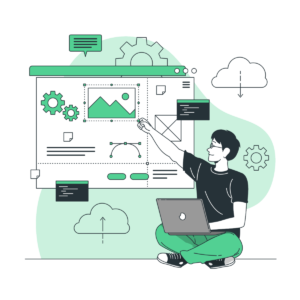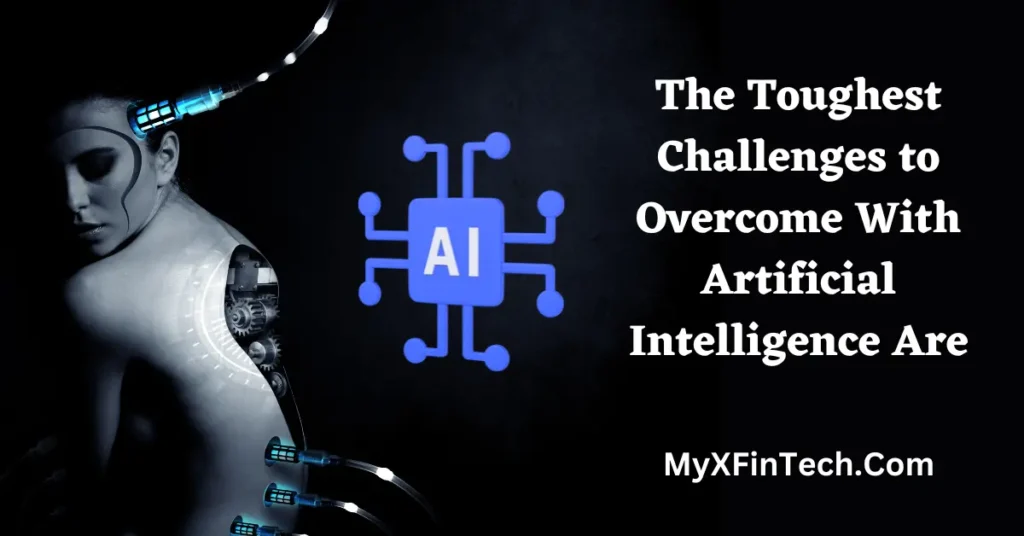Artificial intelligence (AI) is a revolutionary technology that has changed the way we live and work. It has transformed the way we interact with machines, enabled the automation of tasks, and provided data-driven insights that have transformed entire industries.
However, despite the tremendous benefits of AI, there are still many challenges that need to be overcome. In this article, we will discuss the toughest challenges to overcome with artificial intelligence.
1) Ethical considerations in AI development
As AI becomes more prevalent in society, ethical considerations become more critical. AI can be used to create autonomous weapons, discriminate against certain groups of people, and invade privacy.
To overcome these challenges, it is essential to develop ethical standards and guidelines for AI development.
You May Also Like To read
ChatGPT Network Error On Long Responses Solved
2) Data quality and bias

AI systems require vast amounts of data to function correctly. However, the quality of the data used to train AI models can significantly affect their accuracy and reliability.
Additionally, bias in data can lead to biased AI systems. Overcoming these challenges requires data quality checks, data bias identification, and correction.
3) Interpreting AI results
One of the significant challenges of AI is interpreting the results it produces. AI models are often complex and opaque, making it difficult to understand why they make specific decisions.
It is essential to develop AI models that are transparent and explainable to ensure trust in AI and increase the likelihood of acceptance.
4) Security and privacy
AI systems often deal with sensitive and personal data, making them susceptible to attacks and breaches. It is essential to ensure that AI systems are secure, and user privacy is protected.
This challenge can be overcome by implementing secure algorithms and technologies and ensuring user data is stored in compliance with data privacy regulations.
5) Human-AI collaboration
As AI systems become more advanced, they will replace many human jobs. However, there will always be tasks that require human intelligence and expertise.
Overcoming this challenge requires identifying tasks that are best suited to AI and tasks that require human input. Human-AI collaboration can lead to more efficient and effective outcomes.
6) Regulation and policy
AI is still a relatively new technology, and there are few regulations and policies in place to govern its development and use. This lack of regulation can lead to the misuse of AI, ethical violations, and safety issues.
Overcoming this challenge requires developing and enforcing regulations and policies to ensure that AI is developed and used safely and ethically.
7) Computational power and resources
AI models require significant computational power and resources to function correctly. However, the resources required for training and inference can be expensive, making it difficult for small businesses and individuals to develop and use AI.
Overcoming this challenge requires the development of cost-effective AI hardware and software that can be easily used by anyone.
8) Lack of AI talent
There is currently a shortage of AI talent, making it challenging to develop and deploy AI systems. The shortage of AI talent can be attributed to the complexity and technical nature of AI.
Overcoming this challenge requires the development of AI training programs, the attraction and retention of AI talent, and the promotion of AI education in schools and universities.
9) Continual AI learning and improvement

AI models must continually learn and improve to stay relevant and effective.
Overcoming this challenge requires the development of self-learning AI systems that can adapt to changing conditions and requirements. Additionally, AI systems must be regularly monitored and updated to ensure they remain relevant and effective.
10) Integration with existing systems
Finally, integrating AI with existing systems can be a significant challenge. AI systems must.
You May Also Like To read
What Are The Toughest Challenges to Overcome With Artificial Intelligence

Artificial Intelligence (AI) has come a long way and has made significant strides in recent years, but there are still many challenges that cannot be solved with AI alone.
Here are some of the toughest challenges to overcome with artificial intelligence:
1)Empathy
AI may be able to detect human emotions and respond accordingly, but it cannot truly empathize with people.
Empathy involves understanding and experiencing the feelings of another person, which is something that only humans can do.
2) Creativity
While AI can generate new ideas, it cannot create something truly original. Creativity involves thinking outside the box, making connections between seemingly unrelated ideas, and coming up with novel solutions to problems.
These are all areas where humans excel, and AI has yet to catch up.
3) Common sense
AI is excellent at following rules and making predictions based on data, but it lacks the common sense that humans have.
Common sense includes knowledge of the world, an understanding of cause and effect, and the ability to reason about everyday situations. These are all things that are difficult for AI to learn.
4) Morality
AI can be programmed to follow ethical rules, but it does not have a sense of morality. Morality involves making judgments about right and wrong and weighing the consequences of our actions.
It requires an understanding of values, emotions, and cultural norms, which are all things that are difficult for AI to learn.
5) Judgment and decision-making
AI can make decisions based on data, but it cannot exercise judgment in the same way that humans can.
Judgment involves weighing the pros and cons of a situation, considering the context, and making a decision based on experience and intuition. These are all areas where AI has yet to match human capabilities.
Conclusion
While AI has made significant progress, there are still many challenges that it cannot solve.
Human beings have unique abilities that are difficult to replicate with technology, such as empathy, creativity, common sense, morality, and judgment.
These are all areas where human beings will continue to play a vital role, even as AI becomes more advanced.
FAQs What Are The Toughest Challenges to Overcome With Artificial Intelligence
Can AI replace human workers in all industries?
No, while AI can automate many tasks, there are still many industries that require human expertise and creativity.
Will AI be able to develop emotions like humans?
While AI can simulate human emotions, it is unlikely to ever truly experience emotions in the same way that humans do.
Can AI be programmed to make ethical decisions?
AI can be programmed to follow ethical rules, but it does not have a sense of morality, which requires an understanding of values, emotions, and cultural norms.
Can AI be used to solve all complex problems?
No, while AI is excellent at processing large amounts of data and making predictions, there are still many complex problems that require human judgment and creativity.
Will AI replace human decision-makers in the future?
While AI can assist in decision-making, it is unlikely to replace human decision-makers entirely, as judgment and intuition are difficult to replicate with technology.
